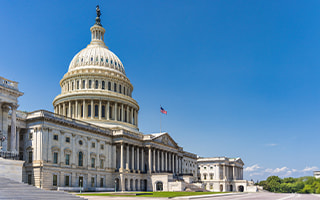US Federal Gambling Excise Tax on the Chopping Block
 At the end of July, two US senators called for the end of a US federal excise tax that adds an extra burden to the gambling industry. The federal tax is currently added after any state or local taxes, taking another 0.25% from every wager placed legally.
At the end of July, two US senators called for the end of a US federal excise tax that adds an extra burden to the gambling industry. The federal tax is currently added after any state or local taxes, taking another 0.25% from every wager placed legally.
The senators have filed a bill to ask for the removal of the tax, which is being called the “WAGER Act,” an acronym for “Withdrawing Arduous Gaming Excise Rates Act.” Catherine Cortez Masto of Nevada and Cindy Hyde-Smith of Mississippi argue that the tax is outdated. They already have strong support from the American Gaming Association (AGA), a trade group that quickly announced its support of the WAGER Act.
AGA Speaks Out
The AGA’s support makes perfect sense given how much the 0.25% tax on wagers adds up each year. The group estimates that removing the excise tax would result in operators keeping tens of millions of dollars in earnings, which currently go to taxes.
The trade group shared a statement to explain its support of the WAGER Act, arguing that the tax no longer has a place in today’s US gambling landscape. According to the AGA, the tax was created 70 years ago to disincentivize illegal gaming, particularly placing bets with sportsbook operators.
Of course, sports betting is now legal in the US on the federal level, with the majority of states also allowing it. This means, the AGA argues, that legal sportsbooks are being unfairly punished for operating within the bounds of the law. Now, inversely, illegal, offshore sportsbooks avoid the tax and churn out more profits.
The AGA’s statement also went on to express frustration with how illegal operators get away with their operations more generally, including not being held to the same standards when it comes to soliciting bets from minors and offering responsible betting resources to their customers. The AGA’s tone strikes a chord with much rhetoric about illegal versus legal gaming in the States at the moment. The division in how betting agencies are treated is keenly felt and largely viewed as unfair by legal betting platforms.
Other Unhappy with Excise Tax
Though the WAGER Act is new, the idea behind it is not. Many have called for a similar repeal of the excise tax, including fellow Nevada Senator Dina Titus. Titus has not officially come out in favor of the WAGER Act yet, but she is likely to add her voice to the push for elimination of the tax. She also made a similar plea for its repeal earlier this year, using the same talking points as the AGA with regards to the burden it places on legal gaming operators while illegal operators get a pass.
Titus, Cortez Masto, and Hyde-Smith certainly have support from legal betting operators as well. Fanatics Betting & Gaming has spoken out about the tax and its potential repeat, saying that removing the tax would be a positive move in the battle against illegal gambling.
Furthermore, another bill was filed in January which also would affect the excise tax. This bill goes by the name of the “GRIT Act,” which stands for Gambling Addition, Recovery, Investment and Treatment. Though this would not eliminate the tax, it would alter how it is used, with 50% of the tax going towards the treatment of problem gambling.
It remains to be seen what will come of both the GRIT and WAGER Acts. Though support is strong from the gambling industry, federal support may be tricky to earn. The federal government currently receives a great deal of money from taxes.
 By Matt Speakman,
By Matt Speakman,

 Gaming Industry Uncertain as Tariffs Impact Financial Markets
Gaming Industry Uncertain as Tariffs Impact Financial Markets NCAA Boosts Responsible Gambling Campaign Due to Betting Ring Scandal
NCAA Boosts Responsible Gambling Campaign Due to Betting Ring Scandal SPGA Warns Louisiana’s SB181 Could Criminalize Loyalty Programs
SPGA Warns Louisiana’s SB181 Could Criminalize Loyalty Programs More Illegal Gambling Websites in Michigan Receive Cease-and-Desist Letters
More Illegal Gambling Websites in Michigan Receive Cease-and-Desist Letters $10.5 Million Fine for Resorts World Las Vegas Casino
$10.5 Million Fine for Resorts World Las Vegas Casino New Jersey DGE Fines Caesars Sportsbook
New Jersey DGE Fines Caesars Sportsbook MGM Prepared to Do Anything to Acquire Entain
MGM Prepared to Do Anything to Acquire Entain Caesars Reveals Plans to Open a Temporary Casino by July Next Year
Caesars Reveals Plans to Open a Temporary Casino by July Next Year Seminole Tribe of Florida Files Replies in the United States Court of Appeals for the District of Columbia
Seminole Tribe of Florida Files Replies in the United States Court of Appeals for the District of Columbia Hollywood Casino Riverboats to Be Moved Inland
Hollywood Casino Riverboats to Be Moved Inland